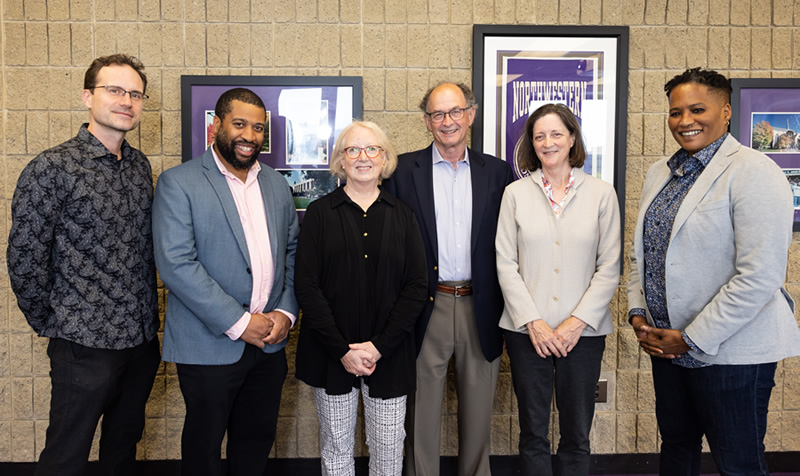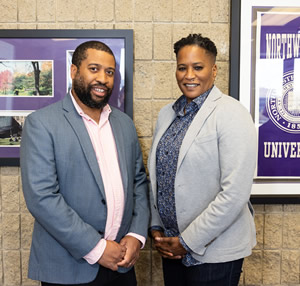Award-Winning Playwright and Screenwriter Gives the 2022 Van Zelst Lecture in Communication
Award-winning playwright and screenwriter Tracey Scott Wilson, known for her work on FX’s The Americans and her teleplay of the Academy Award-nominated biopic of Aretha Franklin, Respect, gave the Van Zelst Lecture in Communication—which took the form of a Q&A with professor and Department of Radio/Television/Film chair Thomas Bradshaw—on Friday, May 27.

“I always wanted to write and always wrote just for fun,” she told the audience at the Norris University Center. “I had this teacher named Ms. Michelle in the fifth grade, and every day we’d have this contest, and we’d write these little short stories and read them aloud in class and vote on the best story. I won every single time except for one time. This guy named Jorge (won), and it wasn’t even a story, it was a joke that he wrote as a story, and I knew that joke because my father had told me that joke.”
Wilson said she clearly remembers the sting of her one defeat, but she also remembers after one of her many wins, her teacher told her, “Tracy, you’re a writer.”
“And I just took it as, OK, that’s what I am…So, I just started calling myself that,” she said. After earning an undergraduate degree at Rutgers University, she went to Temple for her MFA in writing. She wrote her thesis novel, sent it out to agents and publishers, and received mounds of rejection letters. On a whim, she took a playwriting class at the YMCA in New York and had an epiphany.
“I took that class at the Y, and I realized I got that rejection because I’d been writing plays all along,” said Wilson, who would go on to win the 2001 Helen Merrill Emerging Playwright Award, the 2003 AT&T Onstage Award, the 2004 Whiting Award, the 2004 Kesselring Prize, the 2007 Weissberger Playwriting Award, and the 2007 Time Warner Storytelling Fellowship. Her plays, plays The Good Negro and The Story have been produced by the Public Theatre and the Goodman Theatre. But even while she seemed to be doing all the right things, she had trouble making ends meet.
“I had success, I was in production, but I wasn’t getting any money. I was losing money,” she admitted. “I had The Story at the Public and at Goodman. I was getting fellowships. Outwardly, I was very successful, but I was living with my mom because I couldn’t make my rent.”
Wilson said playwrights typically begin to make money once their plays are successfully produced regionally across the nation. “The motto was, you get a hit play in New York, you get the Times review, you get the regional productions, and that’s where you make your money,” she said.
There was just one catch.
 “At the time, there was this unwritten rule, which thankfully has changed now especially after the last two years—the protests and George Floyd… there was one black playwright a season,” she said. “So, one of my good friends…every single time she had a play, and I had a play, her play was the one… It engenders this jealousy…you’re competing for this very, very small slice of pie. It was a dark time.”
“At the time, there was this unwritten rule, which thankfully has changed now especially after the last two years—the protests and George Floyd… there was one black playwright a season,” she said. “So, one of my good friends…every single time she had a play, and I had a play, her play was the one… It engenders this jealousy…you’re competing for this very, very small slice of pie. It was a dark time.”
Yet, her work on the stage drew attention from Hollywood, where producers and showrunners looked to recruit playwrights to write for the small screen. She began flying to Los Angeles to book meetings.
“I’d lie and say I’d watched the show when I didn’t,” she said. “I was so desperate that they could just smell it on me. Also, I’d go in and say I’d write something about class and race and sex, and immediately their eyes would go dead, and they’d say, ‘Thank you very much’ and I was done. This was the time of Grey’s Anatomy, CSI, a lot of those procedural shows, and they weren’t thinking about those kinds of things.”
Then, she got a call from David Schulner (who’d go on to create New Amsterdam) about a new medical drama called Do No Harm.
“When I got a call saying this David Schulner wants to meet with you. I said to myself, ‘I’m not going to lie.’ I was literally filling out an application for UPS when my manager emailed me. I said I’m just going to be myself and whatever happens happens, and if nothing happens, then I’ll work at UPS. He hired me at the end of the interview.”
Do No Harm premiered opposite Scandal and failed to gain traction with audiences. But from there, she got work on the critically acclaimed series The Americans and was hired to write the screen adaptation of music legend Aretha Franklin.
“I don’t know what genius is, but some people are born with it,” Wilson said, and Franklin was one of those people. “She was the daughter of a famous minister, and Dinah Washington and Ella Fitzgerald, and Louie Armstrong, all the major performers of the day, would come to her house and they would perform. She did not finish grammar school…She was the one who at the age of four, she could play whatever she heard. She never learned how to read music.”
At the end of the lecture, made possible by a generous gift from Louann and Theodore Van Zelst, Thomas Bradshaw presented Wilson with the Van Zelst medal.
